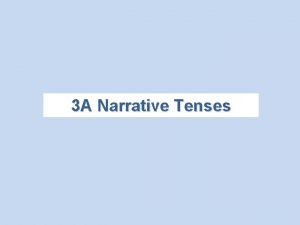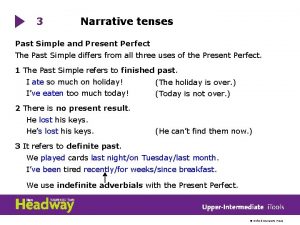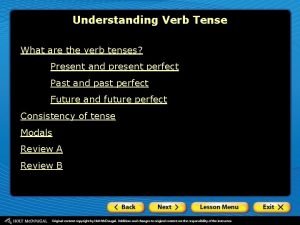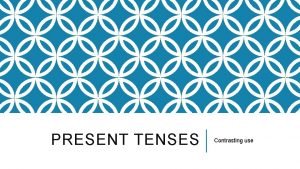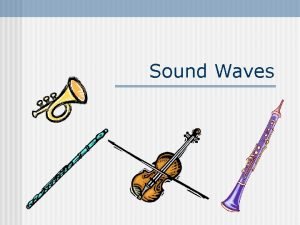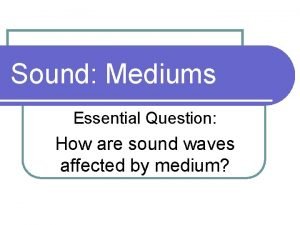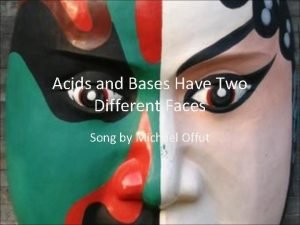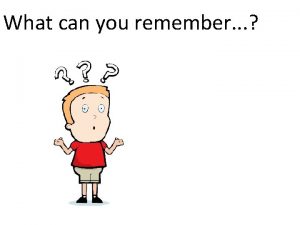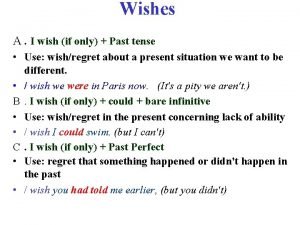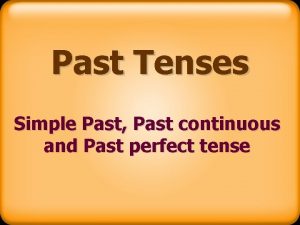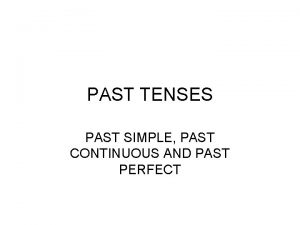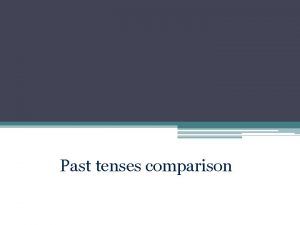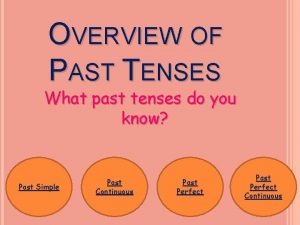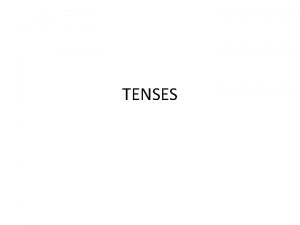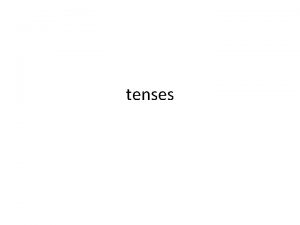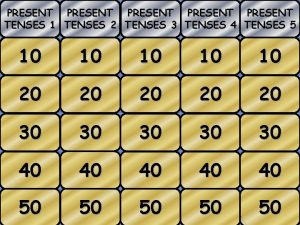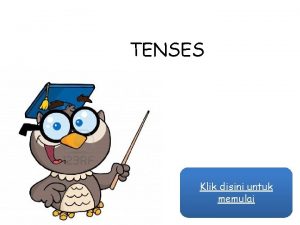PAST TENSES We use different past tenses to















- Slides: 15

PAST TENSES

We use different past tenses to focus on different moments and periods of time in the past. When Andrea arrived to work at 9, 00 a. m. … 8, 30 9, 00 9, 30 10, 00 Her secretary opened the post. Her secretary was opening the post. Her secretary had opened the post.

PAST SIMPLE TENSE � FORM I / you / he /she / it / we / you / they finished left at 5, 00 o’clock. five days ago. I / you / he /she / it a /we / you / they did not (didn’t) finish did not (didn’t) leave at 5, 00 o’clock. five days ago. Did I / you / he /she / it finish / we / you / they leave Did you finish at 5, 00 o’clock? Yes, I did. No, I didn’t. at 5, 00 o’clock? five days ago?

PAST SIMPLE TENSE Usage: � it expresses a finished action in the past e. g. We met in 2005. Tony left 10 minutes ago. � it expresses actions that follow each other in a story e. g. She walked into the room, closed the door and turned on the TV. � it expresses a past situation or a habit e. g. When I was a kid, we lived in a house by the sea. OR When I was a kid , we used to live in a house by the sea.

Spelling of verb + ed most verbs add –ed to the base form: worked, wanted, helped, washed � if a verb ends in –e, add –d: liked, used, hated, cared � in one-syllable verbs, with one vowel and one consonant, double the last consonant before –ed: stopped, planned, robbed � the consonant is not doubled if it is –y or –w: played, showed � the consonant is doubled in two-syllable verbs if the second syllable is stressed: preferred, admitted � verbs ending in consonant + –y , change into –ied: carried, hurried, buried �

IRREGULAR VERBS � In Old English, most of the past simple verbs were irregular. � (Fortunately) this has changed and today there aren’t many irregular ones left. � Still, we have to learn some by heart � Irregular verbs chart – page 157

TIME EXPRESSIONS I met him • last night • two days ago • yesterday morning • in 2001 • in summer • when I was young etc.

PAST CONTINUOUS TENSE � FORM I / he /she / it / we / you / they was working were watching in the garden. the news on TV. I / he /she / it /we / you / they was not (wasn’t) working were not (weren’t) watching in the garden. the news on TV. Was Were I / he /she / it / we / you / they working watching Were you working in the garden? Yes, I was. No, I wasn’t. in the garden? the news on TV?

PAST CONTINUOUS TENSE Usage: � often in sentences with the past simple to refer to longer, background activities, while the past simple refers to shorter, completed actions e. g. The children were playing in the garden when their parents arrived. � to express activities in progress before, and probably after, a particular time in the past e. g. We were having a meeting last night at 7, 30.

PAST CONTINUOUS TENSE Usage: � for descriptions e. g. She looked like a princess. She was wearing a long, silk dress and her eyes were shining. � to express an interrupted past activity e. g. I was having a shower when the phone rang. � to express an incomplete past activity - unlike the past simple which expresses completed actions e. g I was reading a book during the flight. (I didn’t finish it. ) I read a book during the flight. (I finished it. )

PAST SIMPLE OR PAST CONTINUOUS? � past simple focuses on actions as simple facts; past continuous focuses more on duration e. g. I wrote my English term paper. (It is finished. ) I was writing the term paper for three days. � questions in past simple and past continuous refer to different periods of time: past simple asks what happened after, and the past continuous asks about the activities before e. g. What did he do when the war broke out? He joined the Army. What was he doing when the war broke out? He was studying.

PAST PERFECT SIMPLE � FORM I / he /she / it / we / you / they had finished had seen work on time. him before. I / he /she / it /we / you / they had not (hadn’t) finished had not (hadn’t) seen work on time. him before. Had I / he /she / it / we / you / they Had you seen him before? finished seen Yes, I had. No, I hadn’t. work on time? him before?

PAST PERFECT SIMPLE Usage: � to make clear that one action in the past happened before another action in the past e. g. When I got home, I found out that someone had broken into my house and had stolen my DVD player so I called the police. -> someone broke into my house and stole my DVD before I came home I didn’t want to go to the cinema with my friends because I had seen the film. -> I saw the film before my friends did

NOTICE THE DIFFERENCE: � When I arrived at the party, Tony went home. = first I came, then he left � When I arrived at the party, Tony had gone home. = he left before I came there

PAST PASSIVE PAST SIMPLE PASSIVE WAS/WERE + PAST PARTICIPLE This bridge was built in 1885. The books were printed in France. WAS/WERE BEING+ PAST PARTICIPLE PAST The bomb was being defused when it exploded. CONTINUOUS People were being evacuated when the war started. PASSIVE PAST PERFECT PASSIVE HAD BEEN + PAST PARTICIPLE The letter didn’t arrive because it had been sent to the wrong address. He found a submarine that had been sunk in the WW 2. by Irene, 2008
 Narrative tenses past simple past perfect past continuous
Narrative tenses past simple past perfect past continuous Narrative verb tenses
Narrative verb tenses What is verb tense consistency
What is verb tense consistency Present progressive tense examples
Present progressive tense examples Thermosoftening plastics examples
Thermosoftening plastics examples Flame test principle
Flame test principle Sound will travel at different speeds in different mediums.
Sound will travel at different speeds in different mediums. Lrefraction
Lrefraction Cultural relativism
Cultural relativism Different angle different story
Different angle different story Acids and bases have two different faces
Acids and bases have two different faces Different materials have different
Different materials have different Different people different things
Different people different things Argumenterande tal struktur
Argumenterande tal struktur Simple past and past continuous
Simple past and past continuous To wish past tense
To wish past tense
